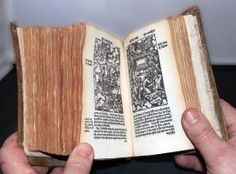
The Tyndale New Testament 1526

The Tyndale New Testament 1526
 |
Page
34
|
| Parchment books were always stored flat because
the parchment was not strong enough to take the weight of the book but Paper
books could be stored upright on shelves although we have evidence in the
Charlecote library that many books were still stored flat for a while. Caxton help to establish the beginnings of a written standardisation of the English Language although even he , in an attempt to produce justified Margins (parallel margins) would lengthen a line where needed by adding extra letters to words, e’s s’s etc This is not to say that manuscripts were no longer produced. They went on for centuries and would be written in the vocabulary of the scribe. Manuscripts were more flexible as changes could be introduced into the very next copy whereas a printer would break up the print blocks for pages that had been printed so required a completely new set up to change a page. It was the typewriter that spelled the end of the manuscript other than for special occasions such as regal and ecclesiastical documents, University Diplomas etc. The Catholic church had already been shaken by Martin Luther’s rejection of the teaching and practices of the Catholic Church and his 95 Theses had been spread far and wide as printed leaflets but now Bibles were appearing in English. The Pope regarded this as a Heresy as it took away the authority and mystery of the Catholic church. Eventually of course, Henry VIII would completely turn away from the Catholic religion and England became a Protestant country and needed an English Bible. This was not because Henry had a religious conversion, he remained a Catholic at heart, but because he wanted to divorce Catherine to marry Anne Boleyn in 1533 and the Roman church would not allow this. Wycliffe’s translation of parts of the Bible had been circulating
in manuscript since the fourteenth century and he was attacking the Catholic
Church 100 years before Luther. He had trained a large number of lay preachers
known as the Lollards to travel the country spreading the Bible in English,
but still in manuscript, and in 1382 there was a show trial leading to
the arrest and torture of many preachers and a ban was declared on English
translations of the Bible. Wycliffe died from a stroke in 1384 but the
manuscript bible continued and in 1521 Henry VIII set Cardinal Wolsey
to track down the Wycliffe manuscripts and held a huge bonfire outside
the original St Paul’s Cathedral, which was said to have burned for
two days. Tyndale in 1524 fled England for Cologne and met Erasmus and
Luther. Erasmus had, in 1516, made a new Latin translation of the New
Testament not from the old Latin sources but from original Greek and Hebrew
texts. Tyndale translated this into English and by 1526 had printed 6000
copies in a small pocket sized edition that was easy to hide. Tyndale
was eventually burned at the stake.
|